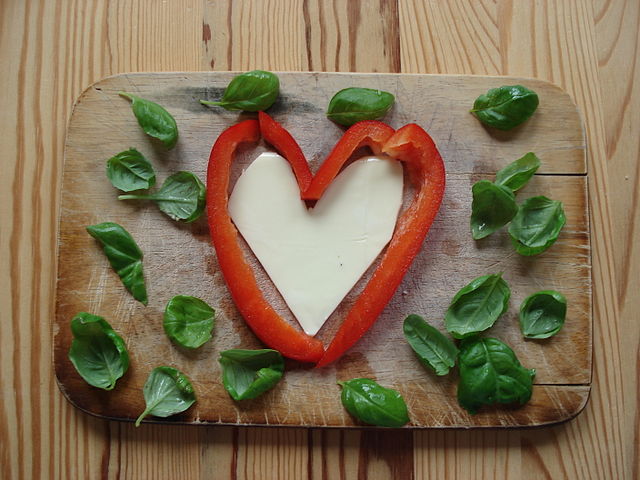“Please step onto the scale… You’ve gained 2 pounds since your last visit.”
Me, three years ago: [internal dialogue] “Gosh darn it! I already watch every bite I eat! Does this mean I have to give up chocolate????”
Me, last week: “Wow, that’s great news!”
Like so many of us, I’ve spent my whole life enslaved to the idea that I must be slender to be healthy and physically attractive. Any weight gain was a personal failure. As my weight crept up slowly by a few pounds each year, I tried now and then to cut back on what I ate, but any weight lost was inevitably gained back.
Meanwhile, I love food. I’d rather go shopping for groceries than just about anything else, and a full pantry makes me feel warm and fuzzy inside. Besides acquiring it and storing it, I enjoy cooking it and, above all, I enjoy eating it. Even when I had a job where I constantly worked late, we had a home cooked meal nearly every night, and I was the one doing the cooking; any meal my husband makes is going to rely on oatmeal, fried eggs, canned soup, or pancakes from a mix. He does make homemade yogurt, he bakes bread, and he makes a fine pot of coffee in the morning, so I’m not complaining.
Lung cancer has caused the biggest change to how food functions in my life that I have ever experienced. From talking with fellow patients, I’ve come to believe that sooner or later, nearly every lung cancer patient is going to go through a period where eating isn’t easy any more and where losing weight is all too easy.
One of the early symptoms of lung cancer can be unexplained weight loss. Often we start treatment already losing weight, and lung cancer treatments have side effects that can make it hard to reverse that trend. Many targeted therapies affect the gastric system, and chemotherapy often causes loss of appetite and changes in how food tastes. Radiation treatments can burn the esophagus, making it painful to swallow. All of these side effects make it a lot harder to do something that is supposed to be easy, to eat.
Loss of appetite is difficult to understand if you have never experienced it outside of being sick with a fever. Twice I have lost my appetite during the adjustment period to a new targeted therapy. Fortunately the experience was relatively brief both times, no more than a week or two, but they were difficult weeks, and they were a learning experience. It is possible for one of the things I enjoy most in life to disgust me, day after day, and that reduces the joy in my life by more than I would have imagined. It’s remarkably hard to make yourself eat if you don’t want to.
Weight loss is common in lung cancer patients and not easy to reverse, especially if you are losing muscle mass rather than fat. I’ve experienced weight loss as well, when an experimental drug I was taking caused me to develop hyperglycemia. The drugs I took to control my blood sugar dumped nutrients out of my body unabsorbed, and I lost 20 pounds over 2 months. If I had been 20 years old, I would have been thrilled with my newly svelte body. I wasn’t thrilled, though, I was frustrated and a bit scared to slowly but steadily lose weight despite eating as much and as well as I could.
Changes in taste are also very troublesome to lung cancer patients who are undergoing chemotherapy. I suggest finding a cookbook oriented towards cancer, which will include a lot of suggestions about how to make food more palatable when the taste buds are under attack by chemo. My local cancer center gave me a book distributed by Merck Pharmaceuticals called “Eating Well Through Cancer”, by Holly Clegg and Gerald Miletello, MD. It has many ideas for perking up the flavor of food and avoiding the metallic taste that often makes eating unpleasant during chemo.
What does science say? Three studies I found all concluded that weight gain by lung cancer patients during chemotherapy is associated with longer survival. These were retrospective studies, analyzing data from patient histories. It would be terribly unethical to try to test the effect of weight gain and loss on survival by controlling the diets of lung cancer patients, so scientists will probably never establish a causal link. Still, that association is enough for me to believe that gaining weight can be a very good thing.
Today I am on my third line of treatment, a targeted therapy drug called Tagrisso. I’m happy to report that I have regained all the weight I lost on the experimental drug. It’s not all in the same places it was before I lost it, but I honestly don’t mind a bit of a spare tire around my middle any more. Every time my doctors see that my weight is up, they smile. And after my appointments, I go have a snack, with pleasure and without guilt.
What have you experienced so far with these issues of loss of appetite, changes in taste, and weight loss caused by lung cancer? Is there anything you have done that has helped you enjoy your food and avoid weight loss?
Reference: “Weight Gain as a Prognostic Factor on Patient Outcomes in Advanced, Nonsquamous, Non-small Cell Lung Cancer”, J. Chen. library.iaslc.org/search-sp...
Photograph By Bukephalos (Own work) [Public domain], via Wikimedia Commons
